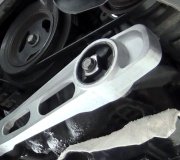ElectroMagnet is a temporary magnet made by coiling wire around an iron core; when current flows in the coil the iron becomes a magnet). The magnetic field disappears when the current ceases. Its a magnet which attracts metals only when electrically activated. The alternator has 2 slip-rings which are connected to the alternators rotor allowing current from the battery to energize the rotor coil or metal coil, creating a Electro-magnet. One slip ring is power the other is ground.
Now current is the flow of electricity (Current is a term used to describe the characteristics of electricity) is described as moving from a point of higher potential (voltage) to a point of low potential voltage). In other word's in a battery for example, the positive plates are made up of lead peroxide and the negative plates are made up of lead now, dipped in the electrolyte water the reaction of the plates in the electrolyte water creates electrons. The plates on the negative side being pure lead makes more electrons while the positive side being not pure lead creates less. Electron as I stated before moves from higher to lower. Yes, not many people know this; but at least in the U.S normally the battery's have current traveling from negative to positive.
For current to be created u need 3 things: an excess of of electrons in one place, a lack of electrons in another and a path between the two places.
With that said, Ground is a common link in a circuit. "Ground" is basically any conductor connected to the battery's negative side, for example the battery negative terminal is connected to the cars "chassis" or 'frame" basically the "chassis" or "frame" would be considered ground because its metal frame acts as a conductor to negative side of the battery. The"Engine" is connected to the frame also, that's a ground also.
Battery's voltage (generally 12.X volts) is lower than the alternator's output (13.8 - 14.2 volts), that's why the alternator voltage is attracted to the battery negative side which is ground. Alternator produces more electrons. Electron flow higher to lower.
But, for some reason when you start your car and completely remove the battery; the car still runs off the alternator. The electrons should stop flowing if there is no ground. It needs something with a low electron charge, (current: needs a lack of electrons in one place and a excessive amount of electrons in another for current to flow) the alternator's output (13.8 - 14.2 volts) would need somewhere of low electrons to flow to.(Normally the battery's negative side) But its been completely remove and the car still runs.
How is the alternator self sustaining itself?
Thursday, May 13th, 2010 AT 2:59 PM
